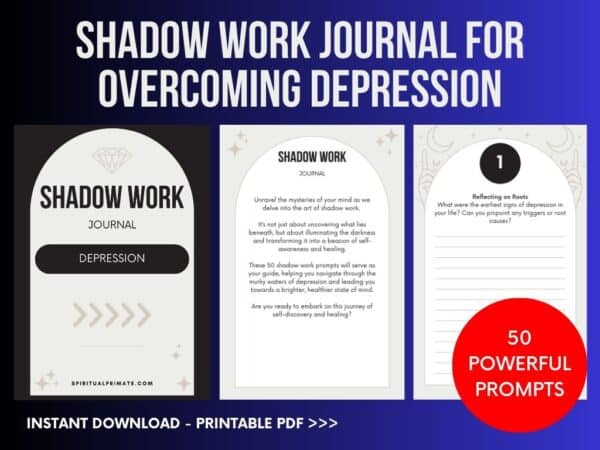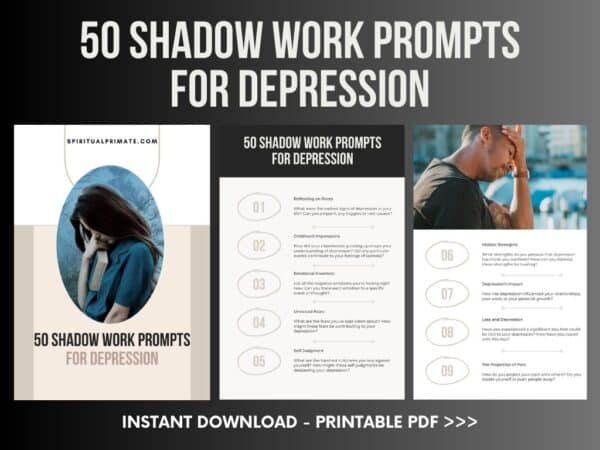Unravel the mysteries of your mind as we delve into the art of shadow work. It’s not just about uncovering what lies beneath, but about illuminating the darkness and transforming it into a beacon of self-awareness and healing.
These 50 shadow work prompts will serve as your guide, helping you navigate through the murky waters of depression and leading you towards a brighter, healthier state of mind.
Are you ready to embark on this journey of self-discovery and healing?

Understanding Depression: A Closer Look
What is Depression?
Depression is a common and serious mental health condition that negatively impacts how you feel, think, and act. It is characterized by a prolonged period of sadness, loss of interest or pleasure in activities, and a lack of motivation. Depression is more than just a bout of the blues; it is not a weakness and one cannot simply “snap out” of it.
Symptoms and Manifestations of Depression
Depression symptoms can vary from mild to severe and can include:
- Feeling sad or having a depressed mood
- Loss of interest or pleasure in activities once enjoyed
- Changes in appetite — weight loss or gain unrelated to dieting
- Trouble sleeping or sleeping too much
- Loss of energy or increased fatigue
- Feeling worthless or guilty
- Difficulty thinking, concentrating or making decisions
- Thoughts of death or suicide
Causes of Depression
Depression isn’t a one-size-fits-all condition. It has various causes, which can range from biological to circumstantial. Common causes include:
- Family history: You’re at a higher risk if depression runs in your family.
- Early childhood trauma: Some events affect the way your body reacts to fear and stressful situations.
- Brain structure: There’s a greater risk if your frontal lobe is less active.
- Medical conditions: Certain conditions may put you at higher risk, such as chronic illness, insomnia, chronic pain, or attention-deficit hyperactivity disorder (ADHD).
Treatment and Management of Depression
While depression can be a debilitating condition, it is also highly treatable. Treatment often involves a combination of medication, psychotherapy, lifestyle changes, and social support. Antidepressants, cognitive-behavioral therapy (CBT), and interpersonal therapy (IPT) are all effective methods of treating depression.
Depression is more than just feeling sad; it’s a complex mental health disorder that requires understanding, compassion, and appropriate treatment. If you or someone you know is struggling with depression, it’s important to seek help. With the right treatment, depression can be managed, and full recovery is possible.

Shadow Work and Depression: A Therapeutic Approach
Shadow work is a psychological approach that encourages individuals to explore and embrace their “shadow self” – the parts of us that we often repress or ignore. This technique can offer a unique perspective on managing depression by helping individuals understand the root cause of their emotions and promoting self-awareness and acceptance.
Understanding Shadow Work
Shadow Work is a self-help approach developed from Carl Jung’s concept of the “Shadow Self.” This refers to aspects of our personality that we either hide, deny, or ignore because they are considered unacceptable by our personal or societal standards. These repressed emotions and traits, when left unacknowledged, can lead to mental health issues like depression.
The Connection Between Shadow Work and Depression
Depression often involves feelings of worthlessness, guilt, and prolonged sadness. These feelings are often linked to repressed emotions, unhealed wounds, or negative self-perceptions – key elements of our shadow self. By delving into shadow work, individuals can confront these emotions, offering a deeper understanding of their depression and providing a pathway towards healing.
How Shadow Work Helps in Managing Depression
Unearthing Repressed Emotions
Shadow work encourages individuals to acknowledge and confront their repressed emotions and past traumas. This process can help alleviate depression by allowing individuals to process and release pent-up emotions, reducing their negative impact on mental health.
Promoting Self-Acceptance
Shadow work promotes acceptance of all aspects of oneself, including the less desirable traits. This acceptance can lead to a healthier self-image and less self-criticism, which are often lacking in individuals suffering from depression.
Encouraging Personal Growth
By acknowledging and embracing the shadow self, individuals can work towards personal growth and self-improvement, promoting a sense of accomplishment and positivity that can counter depressive feelings.
Shadow work offers a promising approach to managing depression by promoting self-understanding, acceptance, and personal growth. It’s about facing what we most fear to find what we most need. This therapeutic approach should, however, be used in conjunction with professional mental health support for the most effective treatment of depression. Always remember, seeking help is a sign of strength, not weakness.

Shadow Work Prompts for Depression
1. Reflecting on Roots: What were the earliest signs of depression in your life? Can you pinpoint any triggers or root causes?
2. Childhood Impressions: How did your experiences growing up shape your understanding of depression? Did any particular events contribute to your feelings of sadness?
3. Emotional Inventory: List all the negative emotions you’re feeling right now. Can you trace each emotion to a specific event or thought?
4. Unvoiced Fears: What are the fears you’ve kept silent about? How might these fears be contributing to your depression?
5. Self-Judgment: What are the harshest criticisms you levy against yourself? How might these self-judgments be deepening your depression?
6. Hidden Strengths: What strengths do you possess that depression has made you overlook? How can you harness these strengths for healing?
7. Depression’s Impact: How has depression influenced your relationships, your work, or your personal growth?
8. Loss and Depression: Have you experienced a significant loss that could be tied to your depression? How have you coped with this loss?
9. The Projection of Pain: How do you project your pain onto others? Do you isolate yourself or push people away?
10. Depression’s Lessons: What has living with depression taught you about yourself and your resilience?
11. Unresolved Conflict: What unresolved conflicts are you carrying? How might these conflicts be contributing to your depression?
12. Expectations vs Reality: How do your expectations about life differ from your current reality? How does this gap affect your emotional well-being?
13. Patterns of Negativity: Can you identify any recurring patterns of negative thoughts? How can you disrupt these patterns?
14. Illusions of Control: In what ways do you feel helpless or out of control? Are these feelings grounded in reality?
15. Beliefs about Happiness: What are your beliefs about happiness? How do these beliefs shape your experience of depression?
16. Guilt’s Burden: Is there any guilt you’re holding onto? How might this guilt be weighing on you?
17. Exhaustion and Depression: How does physical and mental exhaustion contribute to your feelings of depression?
18. Comfort Zones: How might your comfort zones be contributing to your depression? What steps can you take to challenge these zones?
19. Depression’s Language: If your depression could speak, what would it say? What might it be trying to tell you?
20. Physical Manifestations: How does your depression manifest physically in your body? What does this tell you about the mind-body connection?
21. The Role of Shame: How does shame contribute to your depression? How can you challenge feelings of shame?
22. Adapting to Change: How do you cope with major life changes? How might your resistance to change be influencing your depression?
23. The Power of Forgiveness: Who or what do you need to forgive to alleviate your depression?
24. Trust Issues: How have trust issues contributed to your depression? How can you start rebuilding trust in yourself and others?
25. The Influence of Past Relationships: How have past relationships influenced your current state of depression?
26. Personal Boundaries: How might a lack of personal boundaries be contributing to your depression? How can you start setting healthier boundaries?
27. Hidden Grief: Is there any grief you’ve been suppressing? How might this hidden grief be fueling your depression?
28. Emotional Scars: What emotional scars do you carry? How might these scars be linked to your depression?
29. Depression’s Mask: How do you mask your depression from others? What does this mask look like?
30. The Role of Failure: How has your perception of failure contributed to your feelings of depression?
31. The Fear of Success: Does the fear of success play a role in your depression? If so, why?
32. Self-Care Practices: How could improved self-care practices help alleviate your depression?
33. The Impact of Loneliness: How has loneliness contributed to your depression? How can you build more connections in your life?
34. Acceptance and Resistance: What parts of your life are you resisting acceptance of? How might this resistance be fueling your depression?
35. The Weight of Responsibility: How does the weight of responsibility contribute to your depression?
36. Unrealized Dreams: How have unrealized dreams or unfulfilled goals contributed to your depression?
37. The Influence of Social Media: How does your use of social media impact your depression?
38. The Power of Gratitude: How could cultivating a practice of gratitude help alleviate your depression?
39. The Role of Compassion: How might developing self-compassion help you cope with your depression?
40. The Need for Validation: How does your need for validation from others contribute to your depression?
41. Personal Values: How does living out of alignment with your personal values impact your depression?
42. The Impact of Criticism: How does criticism, both internal and external, contribute to your depression?
43. Unhealthy Coping Mechanisms: What unhealthy coping mechanisms do you use to deal with your depression?
44. Influence of External Factors: What external factors (like the environment, societal pressures, etc.) contribute to your depression?
45. Time and Depression: How has your depression changed over time? What patterns can you identify?
46. The Fear of Vulnerability: How does the fear of vulnerability impact your depression?
47. The Role of Perfectionism: How does perfectionism contribute to your depression?
48. Depression’s Illusions: What illusions has depression created in your life? How can you challenge these illusions?
49. The Cycle of Neglect: How might neglecting your physical, emotional, or spiritual needs be contributing to your depression?
50. The Power of Perspective: How could shifting your perspective help alleviate your depression?
We’ve navigated through the labyrinth of our minds, piercing the shadows with the light of self-awareness. Each of these 50 shadow work prompts has the potential to be a stepping stone towards overcoming depression and fostering a deeper understanding of yourself.
Remember, the journey of self-improvement is a continuous one, and every question you ask yourself is another opportunity for growth. Have you identified a prompt that resonates with you, and are you willing to take the first step towards your healing journey?
Dive Deeper Into Your Shadow Work Journey
- Product on sale
 Printable Shadow Work Journal for Overcoming Depression [PDF]Original price was: $11.98.$5.99Current price is: $5.99.
Printable Shadow Work Journal for Overcoming Depression [PDF]Original price was: $11.98.$5.99Current price is: $5.99. - Product on sale
 50 Shadow Work Prompts for Depression | Printable PDFOriginal price was: $5.98.$2.99Current price is: $2.99.
50 Shadow Work Prompts for Depression | Printable PDFOriginal price was: $5.98.$2.99Current price is: $2.99.

